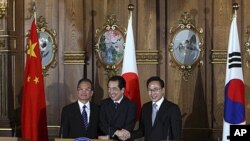Leaders of Japan, China and South Korea concluded a two-day summit in Tokyo Sunday agreeing to cooperate on a number of regional issues, including nuclear safety and trade. The summit comes just over two months after a massive earthquake and tsunami devastated a large part of Japan.
The summit is the first time leaders of the three countries have met since the March disaster. And the meeting's host, Japanese Prime Minister Naoto Kan, promised to share with the two neighbors more details of the Fukushima Daiichi nuclear crisis that was triggered by the disaster.
China and South Korea previously criticized Japan for releasing thousands of tons of radioactive water into the Pacific without giving them prior warning. Kan expressed his regret for that failure during the meeting.
Chinese Premier Wen Jiaobao and South Korean President Lee Myung Bak began their Japan visit Saturday meeting survivors in the disaster region and paying respects to the 24,000 people killed or missing. The two countries were among the first to offer help to Japan immediately following the magnitude 9.0 earthquake.
On business matters, Kan told reporters the leaders agreed to accelerate preparations for a trilateral free trade agreement. He said an agreement will boost trade between the three countries and help Asia as a whole.
Despite their trade connections, historical issues, particularly Japan's colonization of much of Asia during the first half of the 20th century, remain sensitive.
The summit's final communique said the three countries would expand cultural exchanges and tourism to increase friendly ties. They will also promote the use of renewable energy, and cooperate more closely on maritime safety and search-and-rescue.
The leaders also discussed the security situation in northeast Asia. The three reaffirmed their interest in resuming the stalled six-party talks on North Korea's controversial nuclear program.
The three leaders held what Chinese Premier Wen called a "candid exchange of views" on North Korea. Wen reiterated the importance of continued dialogue to get the talks restarted.
Kan, Wen and Lee expressed concern over North Korea's claims of an uranium enrichment program and repeated their wish for denuclearization on the Korean Peninsula.
At the sidelines of the summit, bilateral meetings were also held.
The Chinese premier briefed Japan on Kim Jong Il's recent visit to China and agreed to loosen food import restrictions that were imposed after the Fukushima nuclear accident.
They also began preparations for an official visit to China by Japanese Prime Minister Kan sometime later this year.
A meeting between Japan and South Korea advanced the return of more than 1,200 volumes of Korean historical documents held by Japan since it ended colonial rule of Korea in 1945. The two countries also discussed reconstruction efforts for the disaster-hit northeast of Japan.
The summit was the fourth annual meeting between the three. The fifth meeting will take place in China next year.
East Asian Leaders Agree On Trade, Nuclear Cooperation








